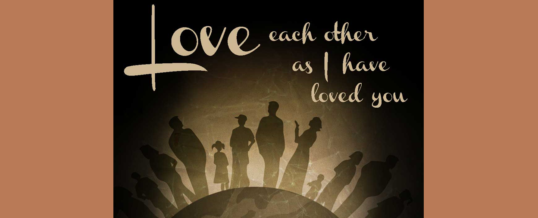
How quickly life can change. That is never more apparent than in the two readings we hear this morning from Matthew’s Gospel. In the first, Jesus is the toast of the town as he enters Jerusalem. Crowds are gathering to offer praise, going so far as to spread their cloaks on the road. By the time we get to the second Gospel, crowds have again gathered (probably a lot of the same people), but for an entirely different purpose. The shouts of “Hosanna” have turned into “Crucify Him”. If you will allow me, I would like to draw comparison from the crowds in our Gospel stories to our own journeys in faith.
Recently I have had the chance to take part in a few different formation events. Each event was filled with people from different churches who I do not work with on a regular basis or even know. For me, it is always interesting to hear other people share their experience of God in their lives and how they share that experience through their ministry in faith formation. What has come to the forefront more than anything else is how much we (I am generalizing here) have moved into our head and out of our heart when we talk about God. We quote verses in Scripture that support our own image of God, or we refer to laws and rules that clearly define where people belong and what they are entitled to.
In a conversation about vows, a close friend said to me recently: “My marriage vows, when you break them down mean one thing, ‘I’m with you, no matter what.’ My vows as a Christian are just as simple. ‘Love God, love yourself, love your neighbour.’” Instantly it reminded me of an old song by The Essex entitled “Easier Said Than Done”. In hearing her say this, I came to the realization that love comes from my heart and not my head. All the other stuff, all the ologies, which are valuable to a degree (no pun intended) come from my head. Jesus lives in my heart. I need to spend more time with him there.
I think that for all our good intentions, we have removed love from the equation, and leaned perhaps more than we should on judgment. Most Christians I know (and I include myself), if asked, would be proud to proclaim their belief in Jesus and in God. However, talk is cheap. How does my life reflect what I claim to be my beliefs? Do I believe that this Jesus, who welcomes me to his table every Sunday welcomes the divorced person sitting behind me, or the single mom in the next section, or the gay or trans person sitting at the back, afraid to move to the front?
If you had asked me that question in my younger years, my answer would have been immediate and clear with little or no thought. I would have passed judgment in an instant. Now, in my older years I look at things a little differently. My beliefs can only inform how I live my life and the decisions I make. They cannot, and will not, guide the decisions of others. Even my own children make choices that probably wouldn’t be my choice. Even when they do, they are still welcome at the table for Sunday dinner. Passing judgment on anyone is not my job, and I don’t want it. My job is to love and accompany. I will leave the judgment to God. As a Christian, I claim to be a follower of Jesus Christ. The one who ate with sinners and hung around with people who got it wrong far more than with people who got it right. He is my model. So, I cannot be a CINO (Christian in Name Only). I can’t say one thing, “Hosanna to the Son of David (I believe in Jesus Christ) and do another, Crucify Him (you aren’t welcome at the same table as me). On this journey of life, I believe we are making judgments every day. My challenge before I make any decision is to ask myself, “What is my most loving response to this situation?” and do it. After all, isn’t that what Jesus did when he decided to leave the garden.
Mark Mahoney
Pastoral Associate, SET
MAR
2023

About the Author: